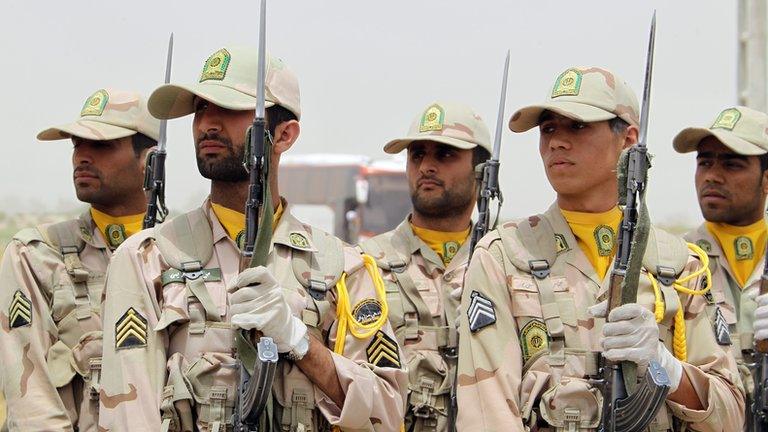Iran warns neighbours after bombing kills Revolutionary Guards
- Published
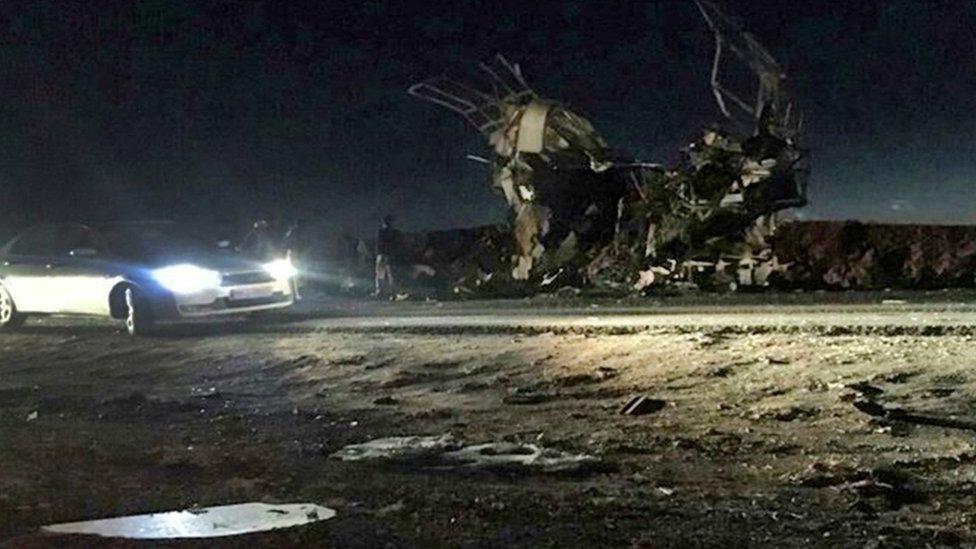
The bus carrying the Revolutionary Guards was torn apart by the car bomb blast
Iran's president has warned its neighbours not to let "terrorists abuse their territory" after a suicide car bombing killed 27 Revolutionary Guards.
Hassan Rouhani blamed the United States and Israel for Wednesday's attack in the south-eastern province of Sistan-Baluchestan, near the Pakistan border.
But he said Iran reserved the right to take action if other countries in the region failed to prevent terrorism.
A group thought to operate from western Pakistan said it was behind the attack.
Jaish al-Adl (Army of Justice) has declared it is fighting for the rights of Iran's Sunni Muslims, who complain of discrimination by the Shia establishment.
The group has carried out several recent attacks against security personnel in Sistan-Baluchestan, which has a large mainly Sunni ethnic Baluchi community.
What do we know about Wednesday's attack?
It was among the deadliest in Iran in years.
The Revolutionary Guards branch in south-eastern Iran said in a statement that a unit of its ground forces had been returning from the Pakistan border area when a vehicle filled with explosives blew up beside their bus on the road between the cities of Khash and Zahedan.
Video and photos of the aftermath of the blast published by Iranian news agencies showed that the bus was torn apart.
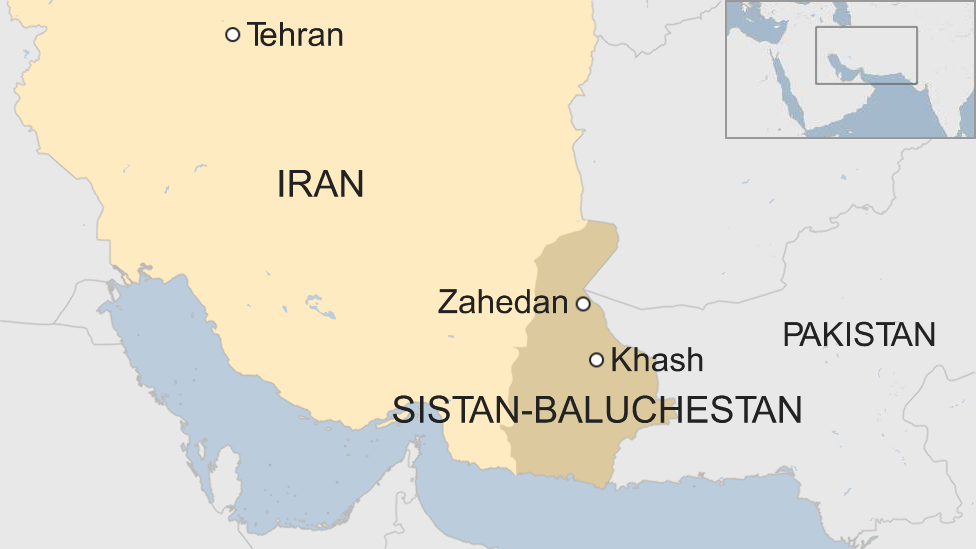
Who does Iran blame?
Jaish al-Adl announced on the messaging app Telegram that it carried out the attack.
The Revolutionary Guards statement blamed "takfiri terrorists and mercenaries of the intelligence services of hegemonic powers", without naming them. "Takfiri" is a term used to describe Sunni extremists who see other Muslims as non-believers.
On Thursday morning, President Rouhani called the attack a "dirty stain on the black record of the main supporters of terrorism in the White House, Tel Aviv and their regional agents".
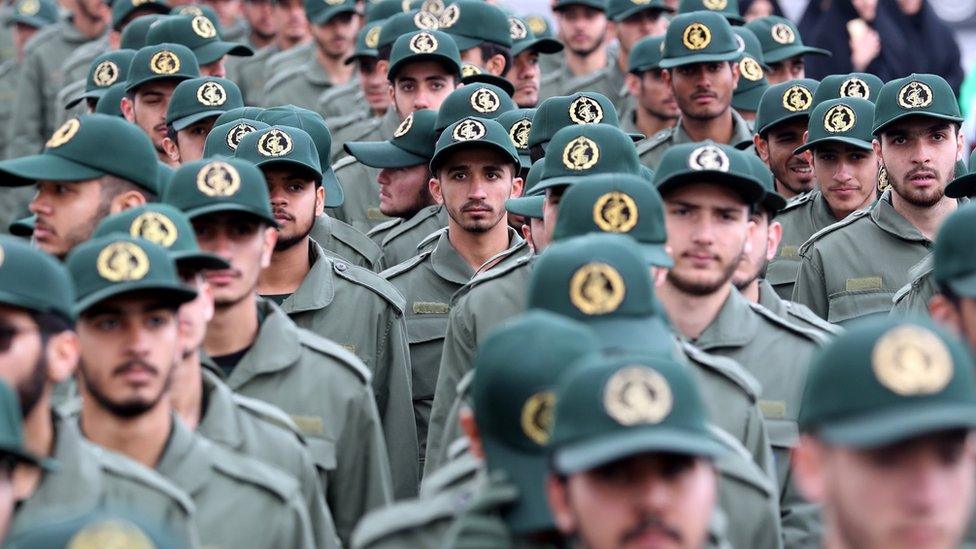
The Revolutionary Guards are a major military, political and economic force in Iran
"We will certainly make this mercenary group pay for the blood of our martyrs," he was quoted as saying by the state-run Irna news agency.
Mr Rouhani advised "certain" states to "pay attention to their legal and neighbourly commitments" and to not allow terrorists to operate from their territory.
"Should such a trend continue and they fail to prevent terrorists, we will have the right based on law and international regulations to pursue our rights in due course."
There was no immediate response to the remarks from the US or Israel.
Iranian Foreign Minister Mohammad Javad Zarif linked the bombing to a US-led conference on the Middle East taking place in Warsaw, Poland.
Allow X content?
This article contains content provided by X. We ask for your permission before anything is loaded, as they may be using cookies and other technologies. You may want to read X’s cookie policy, external and privacy policy, external before accepting. To view this content choose ‘accept and continue’.

What does this have to do with Warsaw?
Iran has been the focus of discussions at the two-day meeting, which is being attended by representatives of 60 countries, including Israeli Prime Minister Benjamin Netanyahu, US Secretary of State Mike Pompeo, and the foreign ministers of several Arab states.
On Thursday, Mr Pompeo called for a new era of co-operation to resolve conflicts in the Middle East. But he also stressed that peace and stability in the region could not be achieved without confronting Iran.
"They're a malign influence in Lebanon, in Yemen, in Syria, in Iraq, the three H's: the Houthis, Hamas and Hezbollah. These are real threats; there are others as well. But you can't get peace in the Middle East without pushing back against Iran."
What do we know about Jaish al-Adl?
The group has carried out attacks against Iranian security personnel since taking up arms in 2012.
Earlier this month, it was blamed for an attack on a paramilitary base in Nik Shahr that left one Revolutionary Guard dead and five others wounded.
The group also said it had carried out two bombings that wounded three police officers in Zahedan at the end of January.
And in October, Jaish al-Adl kidnapped at least 10 security personnel, including Revolutionary Guards, at a border post in Mirjaveh. Five were later released.
In September, gunmen killed at least 24 people at a military parade in the south-western city of Ahvaz.
Both the jihadist group Islamic State (IS) and Iranian ethnic Arab separatists claimed they were behind the assault, but neither provided conclusive evidence.
- Published4 April 2014
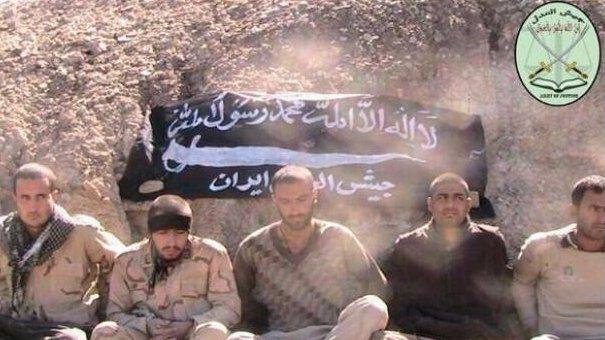
- Published18 December 2013
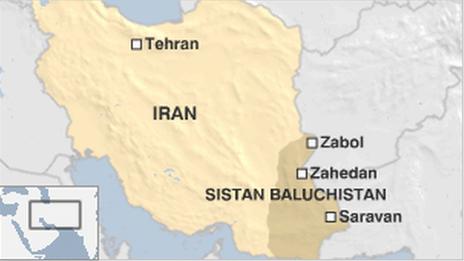
- Published27 October 2013
